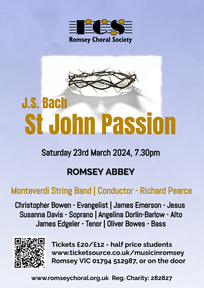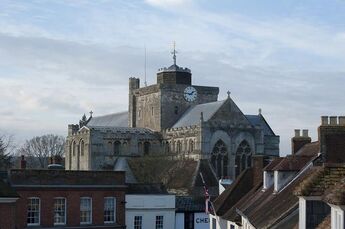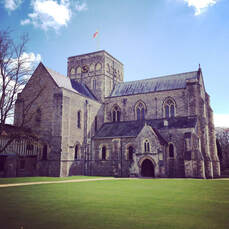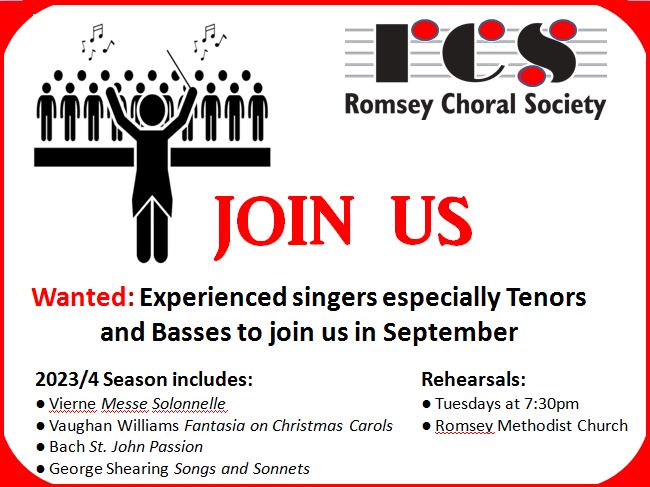Romsey Choral Society Concert Review

Lovers of Shakespeare were in for a treat and a few surprises at Romsey Choral Society's summer concert at St Cross Church, Winchester, on Saturday 6th July. Inspired programme planning by Musical Director Richard Pearce gave the fascinated audience a whistle-stop tour of no fewer than 12 of Shakespeare's plays, as well as a nod to his poetry and that of his contemporaries: Christopher Marlowe, Thomas Nashe, John Fletcher and Robert Johnson.
The selection of texts and musical settings for "Midsummer Shakespeare" had been made carefully. Common themes of romantic love, magic and mysticism and the innocent beauty of nature were juxtaposed with contrasting tales of everyday woes and illicit relationships, reminding us that, in his works, Shakespeare commentates on all aspects of humanity, be they joy or tragic, ethereal or mundane, rational or absurd. In some cases, more than one setting of a text was included, demonstrating the delicate interplay between words and music in conveying - and sometimes misrepresenting - meaning.
The concert opened with Anglo-American composer Sir George Shearing's suite of "Songs and Sonnets" (1999), an upbeat tongue-in cheek collection of seven ditties, featuring the words of some of Shakespeare's more colourful characters, including Autolycus, the thieving vagabond in A Winter's Tale, Touchstone, the jester in As You Like It and Mistress Quickly, the innkeeper in The Merry Wives of Windsor. Deftly accompanied on piano by Richard McVeigh, the choir skilfully negotiated fast tempos, rich harmonies, complex jazz rhythms and getting their tongues around the Elizabethan text at high speed. A moment of exquisite beauty came with the fifth movement, "Who is Silvia" from The Two Gentlemen of Verona. In contrast with the other movements, this is a hymn-like love song, characterised by a restrained tempo, smooth transitions and consonant harmonies. It is only the dramatic context of intended infidelity which suggests ot the listener that this delicious outpouring of emotion is merely Shakespeare being ironic.
Recurrent themes were explored through programming similar pieces by several composers. Wil Todd's take on "It was lover and his lass" (2016) from As You Like It emulates Shearing's version, with its joyous mood, but there the resemblance ends. Todd's version is more lyrical and melodically driven, using key changes and a flowing piano accompaniment to reflect the powerful, fi transitory, romantic influence of springtime. For completeness, the programme included Thomas Morley's 1599 madrigal version of the same text and, with three utterly charming and equally convincing performances, the audience was left contemplating which to choose as their personal favourite.
Sarah Quartel's 2015 setting of "I know a bank where the wild thyme blows" from A Midsummer Night's Dream is a gentle and fanciful description of Titania, Queen of the Fairies, sleeping peacefully in a divine woodland glade, oblivious to the fact that she has been put under a spell following a quarrel with her husband, King Oberon. The choir, with its measured and lyrical vocal lines, supported by a hypnotic piano accompaniment, perpetuates this deceit. In contrast, in his 2017 piece "The Bird of Dawning", Bob Chilcott reflects a more resistant stance to the threat of evil, with text from Hamlet suggesting that the eponymous bird sings al night on Christmas Eve, to welcome Christ and banish evil spirits. This glorious a cappella setting showcased the tight ensemble and blend of the choir; its soaring solo line, representing the bird's song, delivered sweetly and confidently by soprano Linda Stafford.
An interesting inclusion ni the programme was Robert Gower's 1997 arrangement for organ of William Walton's 1944 film score for Henry V. One of the movements from this suite, "Touch her soft lips and part", arranged for unaccompanied mixed voice choir by Bob Chilcott, featured in the second half of the concert; its unsupported interlocking of sinuous and expressive vocal lines conveying a strong sensation of high romance equal to its organ counterpart heard earlier.
Distinct from the buoyancy of previous items, Ivor Gurney's "Five Elizabethan Songs", arranged for choir by lain Farrington in 2015, took us back to the harsh era of the first world war. This sequence of songs takes the listener on an emotional journey throgh the states of innocence, optimism, realism, suffering and - ultimately - peace; stages reflecting the labile and uncertain national mood of the time. Imbued with deep passion, the melancholic flavour of this song cycle was captured beautifully by conductor Richard Pearce and translated sensitively by the choir and accompanist.
Richard then stepped down from the podium to play a glorious contrasting piano medley of Gershwin numbers before the concert concluded with a lively selection of songs from 'West Side Story', Leonard Bernstein's stage musical of 1957, inspired by Shakespeare's Romeo and Juliet, a fitting finale ot this highly entertaining and enjoyable tribute to our national bard.
Kath Tilling
|
Subscribe
Click below to receive information about forthcoming concerts |
|
Latest News
Next Concert - Rossini's Petite Messe Solennelle - After our summer break, we will be starting practicing for our Remembrance Concert on 9th November Review of March Concert - St John Passion by J.S. Bach - A wonderful performance of Bach's St Johns Passion in the beautiful setting of Romsey Abbey on Saturday 23rd March 2024. Read the full review here January 14th Choral Workshop - A very successful and enjoyable Choral Workshop was held in Romsey Methodist Church on Sunday afternoon. Many thanks to Richard Pearce and Richard McVeigh for leading and accompanying us - RCS members we joined bu a further 45 additional guests to learn and sing the Bach St. John Passion in preparation for the upcoming concert in March. |
Choir Diary at a Glance
9th November 2024 Remembrance Concert:
|
Recent Concerts

Midsummer Shakespeare
A wonderful evening of choral music inspired by William Shakespeare. |

J.S. Bach St John Passion
Romsey Choral Society’s Lenten concert, which took place in the majestic surroundings of Romsey Abbey on the eve of Palm Sunday, was a triumph on every level. Sung in German, this performance of JS Bach’s St John Passion – the Easter story according to the Gospel of John – took place almost 300 years to the day after its premiere in St Nicholas’ Church, Leipzig. Under the expert guidance of Musical Director Richard Pearce, soloists, choir and orchestra collaborated to bring to life a glorious rendition of this giant amongst choral works, to the evident delight of a large and appreciative audience. Full Review here |
About Romsey Choral Society
Established in 1981, Romsey Choral Society numbers close to 80 singers - drawn from all over Hampshire and as far afield as Wiltshire and Dorset - and presents four concerts each year, two of which are in the historic surroundings of Romsey Abbey.
Established in 1981, Romsey Choral Society numbers close to 80 singers - drawn from all over Hampshire and as far afield as Wiltshire and Dorset - and presents four concerts each year, two of which are in the historic surroundings of Romsey Abbey.
The Society is now widely recognised as one of Hampshire’s most interesting and vibrant choral groups, having programmed a wide range of music, with everything from plainchant to jazz.
Want to hear us sing?
- Musical Director: Richard Pearce
- Accompanist: Richard McVeigh
Want to hear us sing?
Choir for hire
In addition to our regular concert calendar, RCS can assist by providing a small choir at your weddings, funerals and corporate events.
Click here for a Choir for Hire Enquiry
Click here for a Choir for Hire Enquiry
Get in touch if you are interested in joining the Choir
The Choir |
Concerts |
|



